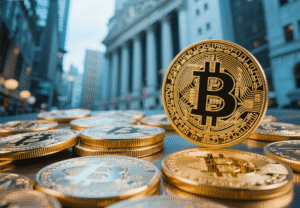Savvy traders never pay full fees. Use these referral codes to save for life: Binance WZ9KD49N / OKX 26021839

Disclaimer:
The views and opinions expressed in this article are solely those of the author and do not reflect the views or opinions of crypto.news’ editorial team.When Satoshi Nakamoto published the Bitcoin (BTC) whitepaper, the goal was clear: to decentralize finance, empower individuals, and eliminate the need for intermediaries. This was a reaction to the shortcomings of the traditional financial system, offering an alternative that placed personal responsibility at its core.
Summary
The growing trend toward custodial solutions in the crypto space risks moving away from its foundational principles. Convenience is increasingly taking precedence over the original values of autonomy, self-responsibility, and decentralization. Custodial platforms pose systemic risks, as seen in high-profile failures like FTX and Celsius, which remind us that entrusting third parties with assets can lead to loss of access and accountability. While self-custody isn’t without its challenges—such as managing private keys—it remains empowering. These challenges can be addressed through innovation, education, and improved user experiences. True cryptocurrency regulation should embrace decentralization and support self-custody rather than forcing crypto into outdated traditional financial models that undermine user sovereignty.As the crypto industry becomes more intertwined with traditional finance, there is a growing risk of losing the original vision that emphasized personal responsibility. Self-custody, where individuals directly manage their digital assets and private keys, is increasingly being sidelined in favor of custodians and exchanges. In doing so, security, independence, and personal responsibility are quietly being sacrificed, leading us back toward the very system that Satoshi aimed to disrupt.You might also like: Self-custody empowers the unbanked and transforms them into a powerful force in emerging markets | Opinion
The Inherent Risks of the Custodial System
There is often a false sense of security when users entrust their digital assets to exchanges, platforms, or custodians that promise to safeguard them. By handing over control to third parties, users effectively relinquish ownership, often without fully understanding the implications. Unlike regulated banks, many crypto custodians operate with limited transparency, unclear terms, and little support for users in case of issues.The collapse of FTX, the freezing of funds on Celsius, and the recent Bybit hack are all examples of how centralized platforms can fail, highlighting the consequences of relying on third-party custody. It’s surprising how quickly the industry forgets these lessons, as centralized custody directly contradicts the core principles of crypto and its decentralized nature.Error: 基础连接已经关闭: 服务器关闭了本应保持活动状态的连接。 Common Questions from Regular Users About Bitcoin
Common Questions from Regular Users About Bitcoin
Disclosure: The views and opinions expressed here belong solely to the author and do not represent the views and opinions of crypto.news’ editorial.
Question 1: What is Bitcoin and why was it created?
Answer 1: Bitcoin is a decentralized digital currency that was created in 2009 by an anonymous person or group known as Satoshi Nakamoto. It was designed to provide a peer-to-peer electronic cash system that eliminates the need for intermediaries like banks. The goal was to create a financial system that is transparent, secure, and resistant to censorship.
Question 2: How does Bitcoin work without a central authority?
Answer 2: Bitcoin operates on a decentralized network called the blockchain. Instead of relying on a central bank or institution, transactions are verified and recorded by a global network of computers. This ensures that no single entity controls the system, making it more secure and resistant to fraud.
Question 3: Is Bitcoin safe to use?
Answer 3: Bitcoin itself is secure due to its cryptographic design and decentralized nature. However, the safety of using Bitcoin depends on how users store and manage their coins. Using strong passwords, hardware wallets, and reputable exchanges can help protect against theft and hacking.
Question 4: Can I use Bitcoin for everyday purchases?
Answer 4: Yes, many merchants and service providers now accept Bitcoin as a form of payment. However, its adoption is still growing, and not all businesses support it. Some people also use Bitcoin as an investment rather than for daily transactions.
Question 5: What happens if I lose my Bitcoin?
Answer 5: If you lose access to your Bitcoin wallet or private keys, the funds are effectively lost forever. Unlike traditional banking systems, there is no central authority to recover your coins. This highlights the importance of securing your wallet and keeping backups of your private information.




